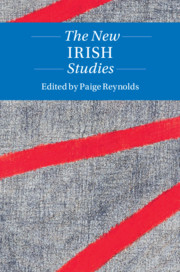Book contents
- The New Irish Studies
- Twenty-First-Century Critical Revisions
- The New Irish Studies
- Copyright page
- Contents
- Notes on Contributors
- Acknowledgments
- Introduction
- Part One Legacies
- Chapter 1 People: Race and Class on the Contemporary Irish Stage
- Chapter 2 Nation: Reconciliation and the Politics of Friendship in Post-Troubles Literature
- Chapter 3 Migration: Migrant Artists Changing the Rules in Post-Celtic Tiger Ireland
- Chapter 4 Language: “World Literature” and Contemporary Irish-Language Writing
- Chapter 5 Land: Neoliberal Wastelands in Contemporary Postapocalyptic Irish Cinema
- Part Two Contemporary Conditions
- Part Three Forms and Practices
- Index
Chapter 5 - Land: Neoliberal Wastelands in Contemporary Postapocalyptic Irish Cinema
from Part One - Legacies
Published online by Cambridge University Press: 18 September 2020
- The New Irish Studies
- Twenty-First-Century Critical Revisions
- The New Irish Studies
- Copyright page
- Contents
- Notes on Contributors
- Acknowledgments
- Introduction
- Part One Legacies
- Chapter 1 People: Race and Class on the Contemporary Irish Stage
- Chapter 2 Nation: Reconciliation and the Politics of Friendship in Post-Troubles Literature
- Chapter 3 Migration: Migrant Artists Changing the Rules in Post-Celtic Tiger Ireland
- Chapter 4 Language: “World Literature” and Contemporary Irish-Language Writing
- Chapter 5 Land: Neoliberal Wastelands in Contemporary Postapocalyptic Irish Cinema
- Part Two Contemporary Conditions
- Part Three Forms and Practices
- Index
Summary
This chapter examines a number of postapocalyptic Irish films produced and released in the aftermath of the collapse of the Celtic Tiger economy in Ireland. It considers the ways in which three of these films in particular, Conor Horgan’s One Hundred Mornings (2009), Stephen Fingleton’s The Survivalist (2015), and David Freyne’s The Cured (2017), represent both the state of the nation in the wake of fiscal catastrophe and its future self-projections: the “post” of “postapocalypse.” The films depict bleak presents, clearly reflecting the socioeconomic context of recession and austerity in which they were made. Yet they also offer bleak futures, with limited potential for transformation or growth. The sites of resistance to neoliberal dystopia that emerge within the films, especially those based on reconstruction of a premodern, pastoral community as an ethical alternative to capitalist subjectivities (a key signifier of the postapocalyptic genre), are profoundly ambivalent and contingent. Thus, the chapter argues, the postapocalyptic cycle of Irish cinema represents a key cultural engagement with the economic discourses of recovery and restoration that emerged almost simultaneously with discourses of crisis in Ireland.
- Type
- Chapter
- Information
- The New Irish Studies , pp. 95 - 110Publisher: Cambridge University PressPrint publication year: 2020

